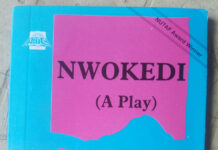📢 Follow our WhatsApp Channel for the latest literary updates!
Ola Rotimi’s The Gods are not to Blame tells the story of man’s struggle against fate. It pits freewill against fate to demonstrate how the gods use man’s weaknesses as triggers for the manipulation of his destiny.
The play is a brilliant adaptation of Sophocles’ Oedipus Rex, given a Yoruba setting and internalized into its cosmos. The play, also replete with proverbs, is a rich demonstration of the undiluted culture and beliefs of the Yoruba people before the advent of Europeans and Arabians.
The Gods are not to Blame shows how the wheels of fate and the weaknesses of a man conspire against him and set him on a cyclic path of bad fate. Whichever way he is taken or runs, he gets closer and closer to fulfilling his ill-fated destiny of killing his father to marry his mother. His restlessness and hot temper, apparently his flaws, bring him closer to the fulfillment of his destiny even when he thinks he has escaped his ill fate.
The play covertly extols the virtues of patience, good leadership, and communal responsibility while denouncing the evils of anger and distrust.
Setting
The setting of the play is Kutuje Land during the pre-colonial period. Most of the actions in the play take place within the precinct of Kutuje Palace.
Snatches of conversation and the use of flashback technique also intimate the readers of prominent Yoruba towns like Oyo, Ife, Ilorin, Ede, Ibadan, Oshogbo and Iwo.
The people of Kutuje are predominantly farmers and hunters. They are also warriors when situation demands. They hold dear their beliefs in Yoruba deities and act in accordance with these beliefs. Their currency of transaction is the cowry which evidently prove the events in the play take place in an era marked by the zero presence of Europeans and their submerging civilisation in the hinterland of Yoruba lands.
Plot Summary
King Adetusa and his wife, Ojuola, of Kutuje Land are in joyous mood on the account of their newly born baby boy, their first son. On the ninth day of the child’s birth, the new parents take the child to the shrine of Ogun, the god of iron, for blessings in the presence of the Ogun priest. In line with the Yoruba customs and traditions, they consult the service of Baba Fakunle, a gifted but blind Ifa priest, to divine the boy’s future.
Divination reveals that the boy is cursed by the gods. He will kill his father and marry his mother.
To prevent this from happening, Gbonka, the king’s special messenger, under the directives of the Ogun priest, takes the boy to the evil bush to die. His feet tied with a string of cowries, the boy is meant to be a sacrifice to the gods who thumb him with his ill fate.
Two years later, King Adetusa and Ojuola beget another son, a consolation from Obatala, the god of creation. They would soon forget all about the ill-fated child left to die in the evil grove.
Thirty two years after the birth of the child that would kill his father and marry his mother, King Adetusa meets a rough death. His kingdom plunges into chaos and crisis. The people of Ikolu frequently ransack Kutuje land, doing all sorts of iniquitous things to its people. However, a stranger of Ijekun-Yemoja tribe comes to the rescue of Kutuje Land.
He leads an all-out attack on Ikolu Land, conquers its people, and seize their lands for Kutuje. This man, Odewale, the son of Ogundele and Mobike, delivers Kutuje people from the captivity of the marauders of Ikolu. In recognition of his valiant efforts, the people of Kutuje defy the long-standing tradition and install Odewale as their king. By default, Odewale inherits Ojuola, the wife of the former king, and marries another woman, Abero, as second wife. Together, Odewale and Ojuola have four children — two boys and two girls.
For eleven years, Odewale rules Kutuje Land in peace and prosperity. Then, everything goes south. Disease and deaths ravage the land. The people bring their complaints, pain, and grief to their king, making it seem as if he is not doing anything at all.
Odewale exhibits good leadership traits here. He listens to their complaints and makes them understand he is not unaffected by the plague ravaging the land. His children too are weighed down by the sickness. While he motivates them to action, he intimates them of what he too is doing to better their lot. He has sent Aderopo, his wife’s son, to Ife to seek for the root causes of the sickness that pervades the land and the solution to it.
Aderopo returns from Ife with even more riddles. The reason for the plague is a man who killed former King Adetusa. The presence of the murderer in Kutuje is what has brought calamities on Kutuje Land.
At first, Aderopo is reluctant to relay this message in public. He wants to tell King Odewale in private but Odewale’s bid to impress upon his followers that he is not inactive and has nothing to hide hinders Aderopo from keeping the message a private issue. Aderopo, upon Odewale’s insistence, relays everything to the public. Aderopo offers to go and bring Baba Fakunle, the blind old Ifa priest, from Oyo to solve the riddle. He is obliged his request.
By the end of Act One, Odewale is left with a riddle, solving the mystery of King Adetusa’s death and unveiling the murderer who has brought much troubles on the Kutuje people.
In his investigation, he hears a lot of speculations about Adetusa’s death. Adetusa was killed on the road to Oshogbo, on his mother’s land near Ẹdẹ. He was in the company of five bodyguards when he was killed. Only one of them returned to tell the people of the king’s murder. The others ran away in fear of being killed by Kutuje people.
Odewale becomes more suspicious of the people he surrounds himself with. He opines that if the people could conspire to kill one of their own, they would not spare him who is a stranger in their land. He directly accuses them of being complicit in Adetusa’s murder. Swearing by Ogun, he vows to expose the murderer to the public. He then promises to put the culprit in everlasting blindness and expel him from Kutuje, the place of his birth to roam in darkness in the land of nowhere.
In Act Two, Aderopo ushers in Baba Fakunle to the Kutuje palace to solve the mystery. Baba Fakunle is disgusted by the presence of King Odewale. The soothsayer is reluctant to say what he, in his blindness, is privy to. But when Odewale, in hot temper, accuses him of being complicit in King Adetusa’s murder, Baba Fakunle calls him the murderer of the former king. At the height of the confrontation between these two, Baba Fakunle also calls him a bedsharer. He claims Odewale’s hot temper is his undoing:
Your hot temper, like a disease from birth, is the curse that has brought you trouble.
Baba Fakunle, in The Gods are not to Blame
After Baba Fakunle’s exit, Odewale accuses Aderopo of being the sole reason Baba Fakunle insulted him. He charges Aderopo of hiring Baba Fakunle to call him the murderer of King Adetusa (Aderopo’s father) and a bedsharer with Ojuola (Aderopo’s mother). Aderopo denies these charges, saying he hasn’t done anything of such.
We learn from their hot exchanges that King Adetusa, according to the divination of Baba Fakunle, was actually killed by a man, not a group of robbers as reported by the bodyguard that came back. Ojuola and the Ogun Priest try to intervene but before they could do any further, Odewale banishes Aderopo from his presence. He swears that may his eyes never see Aderopo again till he dies. Here, Odewale technically banishes Aderopo from the palace in full resentment.
Queen Ojuola’s attempt to wring out the cause of the fracas from Odewale proves abortive. Odewale however reassures her he would tell her later.
In Act Three, Alaka, Odewale’s childhood friend and master, visits him. Like Odewale, he is an Ijekun man. His visit is meant to ease the tension in the air. But it only heightens it.
Premium PDF
There are 1,414 words left in this article and a total of 6,607 words in our premium PDF. Download the entire The Gods Are Not to Blame study guide as a printable PDF now!

Join Our Social Media Channels:
- WhatsApp: Literature PADI
- Telegram: Literature PADI
- YouTube: @literaturepadi
- Facebook: Literature PADI












[…] Critical Analysis of Ola Rotimi’s The Gods are not to Blame […]